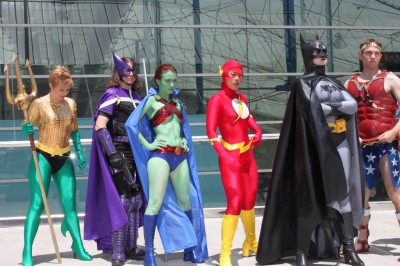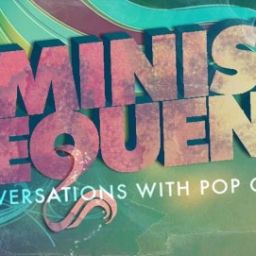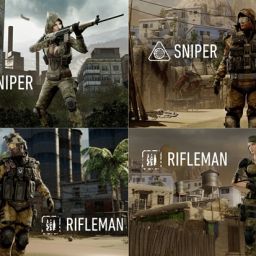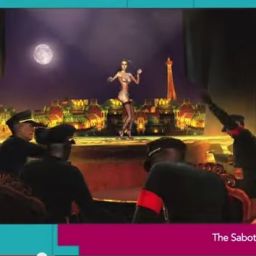by Vivian Obarski and Keidra Chaney
This conversation was on the heels of an in-person conversation that Viv and I had earlier this year, there’s much less profanity, but the ideas are the same. – KDC
VO: Is it just me or is this year the year of harassing geek women? There’s been tons of news about people questioning Felicia Day’s geek cred, the harassment of Anita Sarkeesian for the Tropes vs. Women in Video Games web series and the whole line of “what’s a real geek”? What’s even funnier is seeing this happen roughly at the same time as what was going on in the metal scene.
KDC: Definitely not just you, I think it’s happening in a number of fan communities, that “Girls don’t like metal” post from Metal Sucks comes to mind, even though it was last year. And there have definitely been similar sentiments pop up in other blogs. It’s like open season on chicks who dare to enjoy any kind of pop culture that isn’t Twilight or Fifty Shades of Grey. And it’s weird to me because I swear this level of anger towards women in fan communities seems relatively recent, or at least more pronounced as of late.
VO: I think that some of this that the conversation is coming to the forefront. The Internet is offering the ability for women to speak up and tell their stories and I suspect that (geek-wise) they’re upset because they’ve always been seen as the outsiders that welcome everyone, and it turns out it’s not quite the case. Plenty of my friends have stories of being talked down to or having people play their characters at conventions or where gaming professionals talk to their boyfriends or husbands even though they asked the question.
The anger to me is reactionary to them finally being called out on their shit. And it’s not every guy, but it’s also food for thought on the culture as a whole.
KDC: I definitely agree with you, it’s not like like girl geeks are anything new. they’re not even new to fandom, or online fan communities (i am thinking of old school Star Trek fandom, or the Beauty and the Beast TV show or X-Files fandom in the 90’s) But I do think social media has brought different subsections and fandom niches together in a way that never happened as much before and allowed (forced?) them to co-exist. There’s not a cross-pollination of fandom in-jokes, tropes and culture and maybe for some fanboys, I think there’s a feeling that their special club has been invaded.
Fandom diversity because “mainstream” with social media because it encourages a higher level of transparency, rather than the total anonymity of the old school Internet (BBS, Usenet, etc.) I’m sure back in the day, people thought I was a guy, with the screenname “Pastor of Muppets,” and the fact that I never made a point to call attention to my gender (or for that matter, my race) I’ve had a couple of different experiences with this because as a metalhead, I feel like I’ve not really been talked down to or condescended to much, but then, I’m not super active in online metal fandom, where I think there’s more of that kind of behavior. Personally, I feel like male-dominated online fan culture tends to be more combative by nature, which I think plays a big role.
VO: I think it’s also seeing a different perspective that may not mesh with what they want — for example the vitriol aimed at DC’s reboot and their portrayal of Starfire (which is really, really awful and I can’t see letting my daughter read that, even though she loves Tiny Titans and Teen Titans). It’s like they fail to realize that there’s other audiences out there and it’s more diverse than what they think.
What I don’t get is that by ridiculing others, they’re alienating a potential audience that was ALWAYS there, but never noticed. To say that we’re not “real geeks” or that our voices don’t matter is incredibly insulting. I mean, being ignored is one thing, but outright dismissed? That’s fucking war in my book. But this also reminds me of the rock scene and how people start slagging off on an indie band when they start playing MTV or getting larger audience notice. They’re not selling out – there’s just a wider audience than what you initially thought.
KDC: I do feel like issues of wanting to maintain the status quo come into play: people want what they want and in many cases, especially with fandom, radical change on any level is usually not welcomed with open arms, but this is different to me, this has way more to do with (here we go…) privilege and entitlement, the belief that these communities were only meant for men and can only speak to men and that women are interlopers. I think about the whole music blogger trend of classifying melodic or (non-brootal) metal as “girlfriend metal” as if a.) only women like melody b.) only melodic bands are “safe” or “appropriate” for women. Which of course is some grade- A bullshit. I really do think it has to do with the idea that women are not only participating in these fan communities, but also carving out spaces where the approval and participation of male fans as so – called “experts” is not needed or even considered as a factor of our own enjoyment.
So what to do? Is there anything we, as fangirls, can do, except continue to speak out and be ourselves?
VO: What I’ve seen from my friends, and what I tend to do is just keep on keeping on. Don’t leave because of some asshats (and really, most of the geek dudes I meet at Gen Con are good players and good guys overall) are being jerks. You call them out on that shit and make them rethink their positions. Also, for me, having a good group of friends who are willing to speak up also helps. My view is that they need to be reminded that we won’t go away. We are here to stay and we will continue doing what we like to do, even if you’re weirded out, feel the need to categorize it or talk down to us. We’re here whether you want us around or not.
We’d like to hear your thoughts. Is sexism in fandom on the rise? Or are we just hearing about it more via social media? Leave your comments!






Y’all hit the nail on the head. I have to slightly disagree and expound on something VO said, tho…
” The Internet is offering the ability for women to speak up and tell their stories and I suspect that (geek-wise) they’re upset because they’ve always been seen as the outsiders that welcome everyone, and it turns out it’s not quite the case.”
I think that male geeks didn’t think of an outsiders’ role as “be inclusive”, but because of that outsider role, that they were free of the same high school “the in crowd” or “us v. them” BS that plagues more popular and mainstream communities. In short, male geeks were exposed to extoll the same hierarchies, pettiness, and male-centered rituals that the “jocks and popular kids” do/did. And they don’t like it.
Just my thought. Y’all on point, though. What I’m wondering though, is can this be stopped? For every dude y’all know that does the right thing…*sigh*
Looking back at what I wrote, I think that you’re more on the nose than I had.
As for what to do? Outside of just keeping on keeping on and calling out stupidity when we see it (be it with other players/metal fans/game producers, etc.), there’s not much else. Admittedly I’m an optimist at times and I believe that respectful, but firm calling out of bad behavior is needed. It’s not perfect, but that’s what I know I can do.
It’s not much, but sometimes I have to remind myself that sometimes the smallest action creates big change.
Just seems that every group fancies themselves different on basic levels, and it seems that every group, being comprised of humans with needs, wants, and desires, does the same ish.
I think part of the misogyny comes from the pandering image of female geeks that is plaguing geek culture. Since geek culture is creeping into the mainstream with movies based off of comics being the highest grossing movies of the year, TV shows based off of comics breaking all types of ratings, and video games becoming the biggest selling anything of all time, marketers are trying to make money off of that. What sells? Sex. Now you have marketers selling this image of a sexy gamer girl making out with her Xbox controller, or a half naked lady Robin selling whatever it is that they sell. So you have these so called geeks that aren’t really geeky, because for whatever reason in the geek community you have to prove how geeky you are by knowing trivial details about whatever, and some of them are failing the “test”. Does it justify harassing woman, whether they are “real” geeks or not? Not at all. I think once the pandering image of geek girl goes away, the misogyny should follow.
But why is it that women have to prove themselves with all these tests? That’s my question. Yeah there is pandering, but to assume that all women who are vaguely attractive (whatever that means) who play Xbox or dress in a Slave Leia costume are selling sex is really insulting.
Here’s what I don’t get and this is my basic point — fundamentally, I understand why people are getting upset about this. It’s like when you have that indie band that you followed from club to club and helped pay for their gas money suddenly get HUGE. There’s a certain possessiveness that I basically understand.
But wouldn’t it be more fun to share in the stuff you love instead of hoarding it like a miser? If that girl’s dressed as a sexy Robin, why not ask her what it is about Robin that she digs? Maybe she’s also new to the comic and would love some recommendations. Maybe she knows about the different iterations of Robin and would love to talk to someone about how different writers handled stories. I mean, if she took the time to make a costume and show up to a convention, she’s gonna care about Robin. This assumption that a woman showing up to a convention in costume isn’t a real geek is really odd. After all, we don’t assume that of a guy who’s dressed like Hawkeye or Doctor Who.
And let’s be real — people who cosplay for a con are looking for attention (and I’m not saying this in a creepy sense, but more of the idea that you’re in costume to show off your skills at acting, costuming, whatever). To say that one form of attention seeking is worse than another really doesn’t work for me.
I guess fundamentally, I don’t see why there’s so much suspicion over who is a “true geek”. It’s all about sharing the love. Those who love the same things will stay, those who don’t won’t stay. It’s no skin off my nose either way. I’m still gonna like what I like.
It’s not just women who have to pass these dumb butt tests. For whatever reason, just like in any subculture community, you have to prove how “place subculture here” you are. I agree with you, maybe my point got lost in the scatterbrained on the fly editing I was doing while working at work. I agree with you guys. If you really enjoy something, why not share it? I got out of that “I hate the thing I like is popular” way of thinking when I got out of high school. I try to turn people on to anime. Usually I get laughed at, but I don’t hoard my Bleach DVDs to myself. Everyone should enjoy whatever they enjoy and not worry about labels.
As far as the pandering, I can only speak for myself, but when I see someone trying to sell me this sexy image of the nerd girl, because that’s the thing, I feel insulted. I feel like they are making a mockery out of something I enjoy. That may not be the case, but that’s how I sees it.
I feel as a man, when guys harass women in cosplay costumes or say dumb things like “girls can’t be gamers,” it makes the whole scene look trashy and justifies whatever stereotype people have about people who fall into that group.
I totally understand how you feel about pandering, but that’s where my ire is aimed more at the people selling the stuff (and feeling like they need to use booth babes and these broad stereotypes), rather than the people who are showing up to the cons dressed as a burlesque genderbent Avenger.
But for me, pandering always has existed in everything. Everything we love or do has an element of someone trying to sell something to us. Maybe with geek culture (I can’t speak for metal to be honest), it’s that it’s starting to hit the mainstream now so a lot of people are dealing with the discomfort of mainstream marketing being targeted at us. And they clearly don’t get it.
Again, this gets back to the analogy of your favorite indie band hitting the big time (and obviously the people marketing that band don’t get the band they way you do).
And you’re absolutely right on other groups having to pass tests within subcultures. I think that’s part of the tribalism that any group creates within itself to recognize fellow members. It’s pretty silly honestly.
[…] if an industry starts to draw in some women – video games, comics, sports – those women are belittled or rejected because of some misguided desire to preserve the ‘boys only’ culture of the […]
[…] if an industry starts to draw in some women – video games, comics, sports – those women are belittled or rejected because of some misguided desire to preserve the ‘boys only’ culture of the […]
[…] if an industry starts to draw in some women – video games, comics, sports – those women are belittled or rejected because of some misguided desire to preserve the “boys only” culture of […]
[…] implicitly suggesting that the Borg have no interest in any females they encounter. This reflects an uncomfortable streak in cult fandoms that is occasionally prone to outbursts of misogyny. (Something that has really been pushed to the fore in the internet age.) There’s really no […]